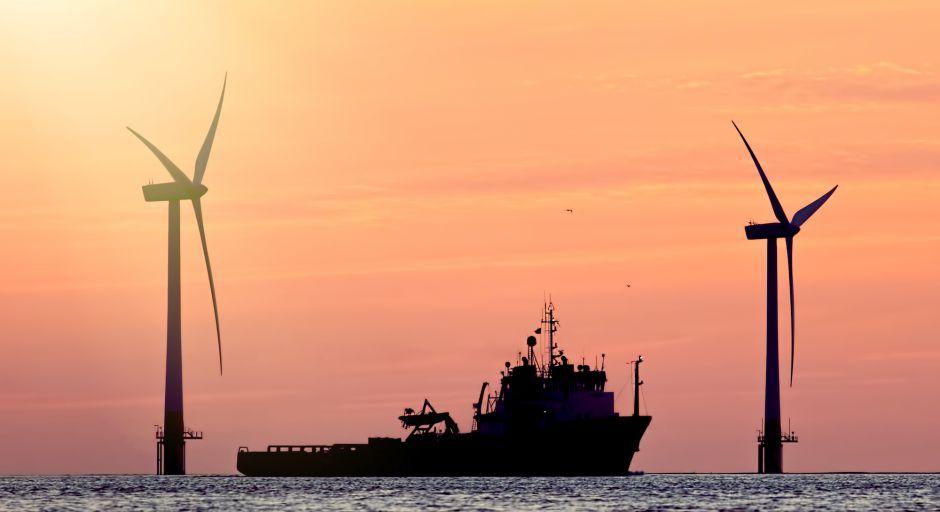Maritime law and maritime planning need improvement

Route changes, longer travel times, higher fuel consumption, increased crew costs, and higher insurance costs. Shipping is at risk of being affected in several ways when offshore wind power is integrated into the marine environment. According to two new pre-studies from Lighthouse, maritime law and maritime planning need to be enhanced.
Offshore wind power is considered one of the most promising alternatives for renewable electricity production. However, many wind farms occupy large areas and are often located in regions with intense ship traffic, which naturally conflicts with the needs and interests of shipping.
“It can have negative effects on the safety, efficiency, and commercial operations of shipping. Studies have shown that there is a higher risk of accidents, and route changes can, for example, lead to increased costs,” said Jeanette Andersson, a researcher at VTI, when two new pre-studies on maritime law and maritime planning were presented at a webinar this week.
She is one of the authors of one study focusing on the legal aspects in both decided and upcoming maritime plans and subsequent permitting processes.
“A specific purpose has been to investigate and analyze the legal conditions for shipping in the economic zone during the planning and decision-making process for wind power establishment.”
For the construction of wind power in Sweden's economic zone, a permit is required from the government according to the law (1992:1140) on Sweden's economic zone (the sea area outside Sweden's territorial waters where Sweden has special rights regarding the use of marine resources). The permit review for wind power must consider, among other things, chapters 2-4 of the Environmental Code and the United Nations Convention on the Law of the Sea (UNCLOS).
The report emphasizes that neither the Environmental Code nor UNCLOS provides much guidance on how to balance the interests of shipping against the interest in expanding wind power. For example, UNCLOS gives the coastal state the right to establish installations and structures in the economic zone but also states that these must not impede "recognized sea lanes essential to international shipping." What exactly does that mean? The authors believe there is a need for in-depth research on such questions.
“It is also important to have a comparative research study on how other countries regulate the interests of shipping in relation to other uses of marine areas. Additional research is also needed on how the permitting process can become more predictable,” said Jeanette Andersson.
The authors also suggest that maritime plans, which are currently not binding, be designed in a more binding manner similar to municipal detailed plans. This means that all maritime interests need to be considered already at the planning stage and not during the permitting process.
The other pre-study has closely examined the potential effects a large-scale expansion of offshore wind power could have on Swedish shipping and industry. The study was conducted through spatial analyses of maps and AIS data as well as interviews with members of the industry association Svensk Sjöfart.
The analysis shows that offshore wind power creates new risks for shipping through reduced maneuvering space and decreased safety distances. The extent of the impact varies depending on the type of vessel, traffic frequency, and chosen routes. The industry is also concerned about the cumulative effects the expansion of offshore wind power can have, said Jessica Hjerpe Olsson at RISE, one of the authors of the report.
“It involves three different things: the effects of all parks in Swedish waters, but also the Swedish parks together with parks in neighboring countries' waters. It can also involve a vessel frequently navigating a route with a park, perhaps several times a day, where route extension is forced multiple times.”
According to the report, there is concern that the cumulative effect of route changes leads to increased lead times and costs for shipping companies. There is also concern that the environment will be negatively affected by increased emissions and that individual cargo owners and/or ports may be particularly negatively impacted. The preliminary study concludes that a coordinated strategy is needed for the spatial interests of shipping to facilitate and minimize conflicts while ensuring the sustainability of both shipping and wind power.
Read the reports:
-
 2025 – ett år präglat av osäkerhet
2025 – ett år präglat av osäkerhet -
 "Ögon på plats” tidigt kan rädda liv
"Ögon på plats” tidigt kan rädda liv -
 Antifoulingfärger testas bäst i strömmande vatten
Antifoulingfärger testas bäst i strömmande vatten -
 Så kan biogasen få en betydande roll för sjöfartens omställning
Så kan biogasen få en betydande roll för sjöfartens omställning -
 Från motorbåt till militärfartyg – traineeprogrammet gav Isak nycklarna till sjöfartsbranschen
Från motorbåt till militärfartyg – traineeprogrammet gav Isak nycklarna till sjöfartsbranschen -
 DNV: Metanol är ett moget alternativt bränsle
DNV: Metanol är ett moget alternativt bränsle -
 Se Hållbar sjöfarts uppsamlingsheat
Se Hållbar sjöfarts uppsamlingsheat -
 NextWave – en podd som ska locka unga
NextWave – en podd som ska locka unga -
 Ny studie: Eldrivna pendelbåtar kan effektivisera Stockholms kollektivtrafik
Ny studie: Eldrivna pendelbåtar kan effektivisera Stockholms kollektivtrafik -
 Sjöfartens utsläpp ökar
Sjöfartens utsläpp ökar

